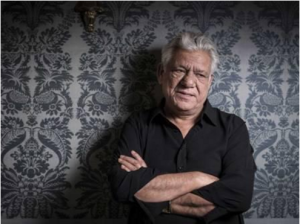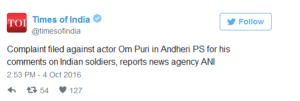KARACHI: Two leading former Pakistani diplomats had an interesting interaction during a session on foreign policy and economy at the Karachi Literary Festival, disagreeing on a host of issues, including the nuclear policy and role of the security establishment, but agreed, along with the third panellist, that the country today stood isolated because of flawed policies.
From the very start of the discussion it was quite clear that there would be some serious disagreement, if not fireworks, on the way the country has been run by the ruling elite, particularly the military establishment.
Ambassadors Ashraf Jehangir Qazi and Zafar Hilali took very different positions on what ailed Pakistan, and its foreign and security policies. And to add a new dimension to the debate, scholar Dr Zia Mian added the nuclear factor, stating that the policy was not only dangerous, but was also one of the main reasons for slow progress in the country.
As was expected, Mr Hilali was quick to respond and strongly advocated that Pakistan should maintain its nuclear deterrence to offset India’s superiority in conventional weapons.
Mr Hilali sounded emotional when he said: “With [Narendra Damodardas] Modi [at the helm], look at the situation the Muslims in India are living in. They are creating another Pakistan within India. Only I’m not saying this, Christians are saying this; human rights people are saying this. I would rather be dead than live as a Muslim in Modi’s India. If you did not have nuclear weapons, India would have gobbled you up by now. India can wipe the floor within two weeks because of the strength they have.”
Giving the example of India, where after the Mumbai attacks and consequent talk of a looming nuclear war between the two neighbours, billions of dollars were withdrawn from the stock exchange there, the former diplomat acknowledged that no foreigner would invest in a country that could potentially be turned into a nuclear holocaust.
“But when India keeps pressure on us through terrorism financing in Balochistan, through the TTP; if they keep us destabilised, you have to strike back in some way. Operationalise your tactical weapons. Move them up if necessary. If you see their troops massing on border for an attack, don’t you honestly think you should not use your tactical weapons? Why not? What are they for? You use it, or you lose it.”
Nuclear physicist Dr Pervez Hoodbhoy, a bitter opponent of nuclearisation who was sitting among the audience, took umbrage at the suggestion and when given the mike to speak, he argued against Pakistan having nuclear weapons. Disagreeing with the speaker over the situation in India, he said: “More Muslims are being killed in Pakistan than in India.”
Mr Qazi, a columnist and former ambassador to the United States and India, said he agreed with Mr Hilali that Pakistan should have at least the minimum nuclear deterrence, but what he disagreed with was the suggestion to use tactical weapons. Once such weapons were used, they would inevitably lead to a nuclear war. “India has already threatened that in response to the use of tactical weapons, it will use the weapon of its own choice.”
He also said: “We have to look at our challenges in much deeper and broader context rather than choose efficient bombs.”
He explained how Pakistan’s foreign policy, being part of national policy, was formulated in which besides the security and intelligence agencies, the bureaucracy also played a role.
He said there was no doubt that Pakistan had been a security state since its inception because of its geographical location and its policies had been driven by security concerns. He suggested that Pakistan should take measures to strengthen both its security and economy.
He said the government should invest enough in the health, education and social sectors.
Mr Hilali said that while keeping India at bay through nuclear deterrence, Pakistan could focus on its development.
He criticised the government’s economic and security policies. He assailed the prime minister for taking pride in a strong currency and remarked: “Where in the world does a country have a strong currency and a weak economy?”
Discussing India’s growing relations with countries such as the United States, Afghanistan and Iran, he claimed that even the United Arab Emirates, where Pakistanis had invested billions of dollars, had drifted to India’s side. “The UAE has even offered India its port to carry out ‘surgical strikes’ in Pakistan, though there has been no word on it from our government,” he said.
Ilhan Niaz, an author and teacher at the Quaid-i-Azam University in Islamabad, was the moderator.
Published in Dawn

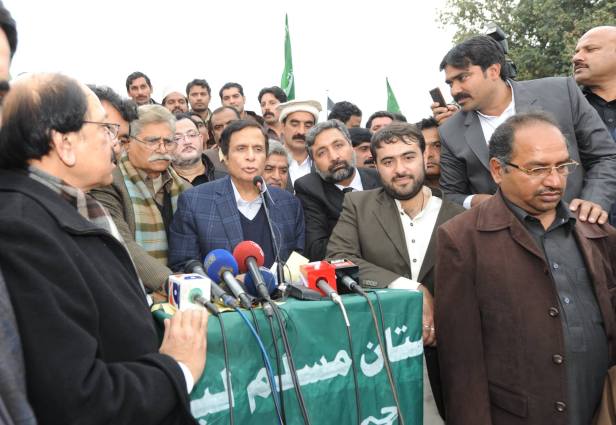 Addressing a very big quite enthusiastic Workers Convention in Gujranwala today, he said that during our tenure even poor patient was taken to the hospital on ambulance where free medicines were provided to him even injecting costing up to Rs 10 thousand was also given free, but now the patient is told to come to the hospital along with cot, bed and medicines from home. He said that there are neither beds nor medicines in the hospitals now, patients are breathing last lying on cold floor,
Addressing a very big quite enthusiastic Workers Convention in Gujranwala today, he said that during our tenure even poor patient was taken to the hospital on ambulance where free medicines were provided to him even injecting costing up to Rs 10 thousand was also given free, but now the patient is told to come to the hospital along with cot, bed and medicines from home. He said that there are neither beds nor medicines in the hospitals now, patients are breathing last lying on cold floor,  Continuing, he said that
Continuing, he said that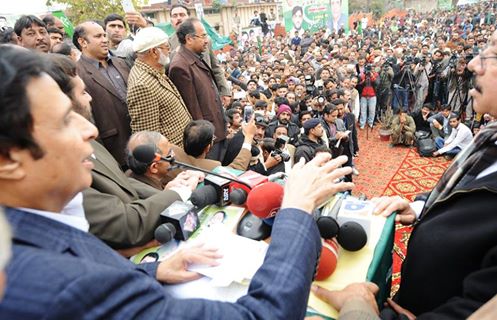 He pointedly stated that whichever scheme was started during our tenure is still functional, we were providing job opportunities to ten lakhs people every year, Shehbaz Sharif had started 9 schemes all of which have failed, Nandipur power Project, Bahawalpur Solar Power Project and Sahiwal projects all have failed, what other cities of Punjab will get from Orange Line, people do not need show off projects like jangla bus, they need medicines in hospitals and education in schools, N-League people are involved in Panama Case, all those who were mentioned in this case had resigned but they are sticking to the chair for last six months.
He pointedly stated that whichever scheme was started during our tenure is still functional, we were providing job opportunities to ten lakhs people every year, Shehbaz Sharif had started 9 schemes all of which have failed, Nandipur power Project, Bahawalpur Solar Power Project and Sahiwal projects all have failed, what other cities of Punjab will get from Orange Line, people do not need show off projects like jangla bus, they need medicines in hospitals and education in schools, N-League people are involved in Panama Case, all those who were mentioned in this case had resigned but they are sticking to the chair for last six months.
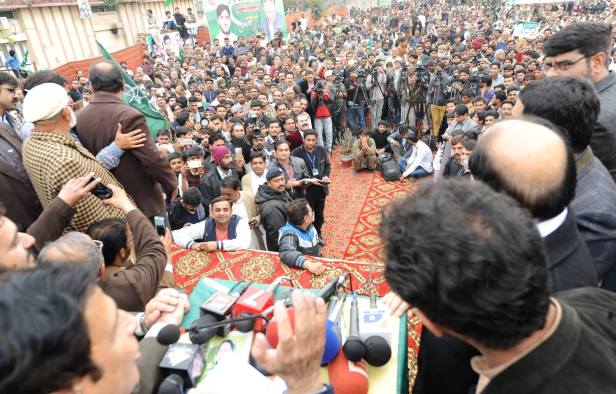 He said that we had started Sialkot-Lahore Motorway on which two foreign universities were also to be established which were shifted to India because of their incompetency, incompetent Chief Minister has put Punjab under heavy debt of Rs 2000 billion.
Paying rich tributes to active colleagues, he said that our party needs workers like Zain Ali Bhatti.
He said that we had started Sialkot-Lahore Motorway on which two foreign universities were also to be established which were shifted to India because of their incompetency, incompetent Chief Minister has put Punjab under heavy debt of Rs 2000 billion.
Paying rich tributes to active colleagues, he said that our party needs workers like Zain Ali Bhatti.
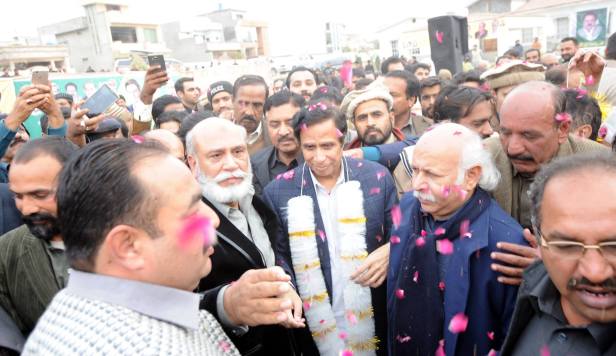 The Convention was also addressed by Tariq Bashir Cheema, Ch Zaheeruddin and Khawaja Waqarul Hassan while those seated on the stage on this occasion included Muhammad Basharat Raja, Zain Ali Bhatti, Bao Rizwan, Mian Imran Masood, Tanveer Azam Cheema, Col (R) Abbas, Hussain Elahi, Zubeida Ehsan, Irfan Ehsan, Ch Zulfiqar Pappan, Haji Shakir Mobeen, Ch Nasir Inayat Sira advocate, Engineer Shehzad Ali and other party leaders.
The Convention was also addressed by Tariq Bashir Cheema, Ch Zaheeruddin and Khawaja Waqarul Hassan while those seated on the stage on this occasion included Muhammad Basharat Raja, Zain Ali Bhatti, Bao Rizwan, Mian Imran Masood, Tanveer Azam Cheema, Col (R) Abbas, Hussain Elahi, Zubeida Ehsan, Irfan Ehsan, Ch Zulfiqar Pappan, Haji Shakir Mobeen, Ch Nasir Inayat Sira advocate, Engineer Shehzad Ali and other party leaders.
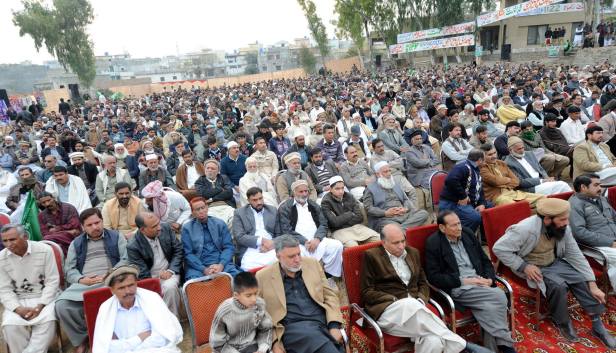 Earlier on arrival at the venue Ch Parvez Elahi was enthusiastically welcome by chanting of loud slogans and showering on flower petals. Convention participants kept raising repeatedly slogans of Ch Shujat Hussain,
Earlier on arrival at the venue Ch Parvez Elahi was enthusiastically welcome by chanting of loud slogans and showering on flower petals. Convention participants kept raising repeatedly slogans of Ch Shujat Hussain, 

